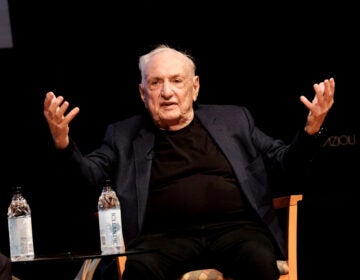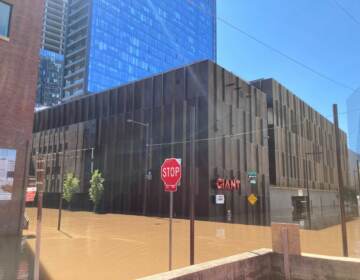Meet the woman turning a West Philly lot into an ‘Earthship’ made of tires and glass bottles
Rashida Ali-Campbell just won a three-year court battle over the control of the West Philly lot she wants to turn into an eco-home and oasis.
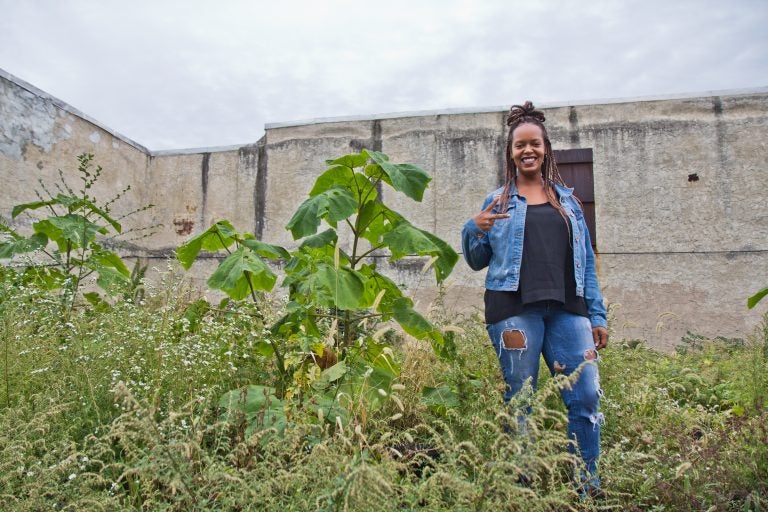
Rashida Ali-Campbell on her lot on N 41st St. (Kimberly Paynter/WHYY)
The weeds at 675 N. 41st Street stand six feet tall. The overgrowth creeps over piles of tires, cans and broken bricks.
It’s hard to believe anyone would fight for this lot. But for the past ten years, Rashida Ali-Campbell, the lot’s owner, has been doing just that — engaging neighbors, petitioning City Council and winning property battles — all for the right to build a house out of trash.
Because when she looks at the land, she sees past the mess.
This week, she showed PlanPhilly around.
“This is the entrance,” Ali-Campbell said, gesturing to a pile of gravel. “The project area, the bathrooms over here, a kitchen. We’ll have fresh fruits and vegetables growing in a planter over here, chickens here… I can see it, our Earthship.”

An Earthship is an alternative eco-home built from repurposed materials like old tires, empty cans, and glass bottles. It’s meant to be completely self-sufficient — managing a sustainable water collection and sewage system while producing its own electricity, heat, and food. Ali-Campbell estimates it will cost $200,000 to build one on her lot.
Ali-Campbell first heard about the concept in 2009 while watching a documentary. She’d never built a home — as the executive director of community-based non-profit LoveLovingLove, her background is in providing health counseling and familial support — not in construction. But when she saw the structure, she knew two things.
First, she wanted to build one for families like hers. As someone who grew up in poverty, Ali-Campbell said, she understood the way drugs and violence trapped families. She knew first-hand what it was like to live in shelters, to go in and out of foster care. The Earthship she envisions — a safe, beautiful place for kids to go and get their physical and emotional needs met — is the oasis that didn’t exist for her, in a world where no one else seemed to care about her or what she wanted.
“I came from this community,” she said. “I can do something about it.”
And second, she wanted to build in West Philly. Although Ali-Campbell lives in Yeadon in Delaware County now, she and her husband had recently moved from the west side of the city. They’d noted the abandoned lots, the high rate of poverty, and the lack of readily available or affordable nutrition.
“[At the time], there was a lot of talk about making Philadelphia more sustainable,” Ali-Campbell said. “There was also talk about vacant land, abandoned houses, illegal dumping, food deserts… and so I looked at the Earthship as a way to combat many issues at once.”
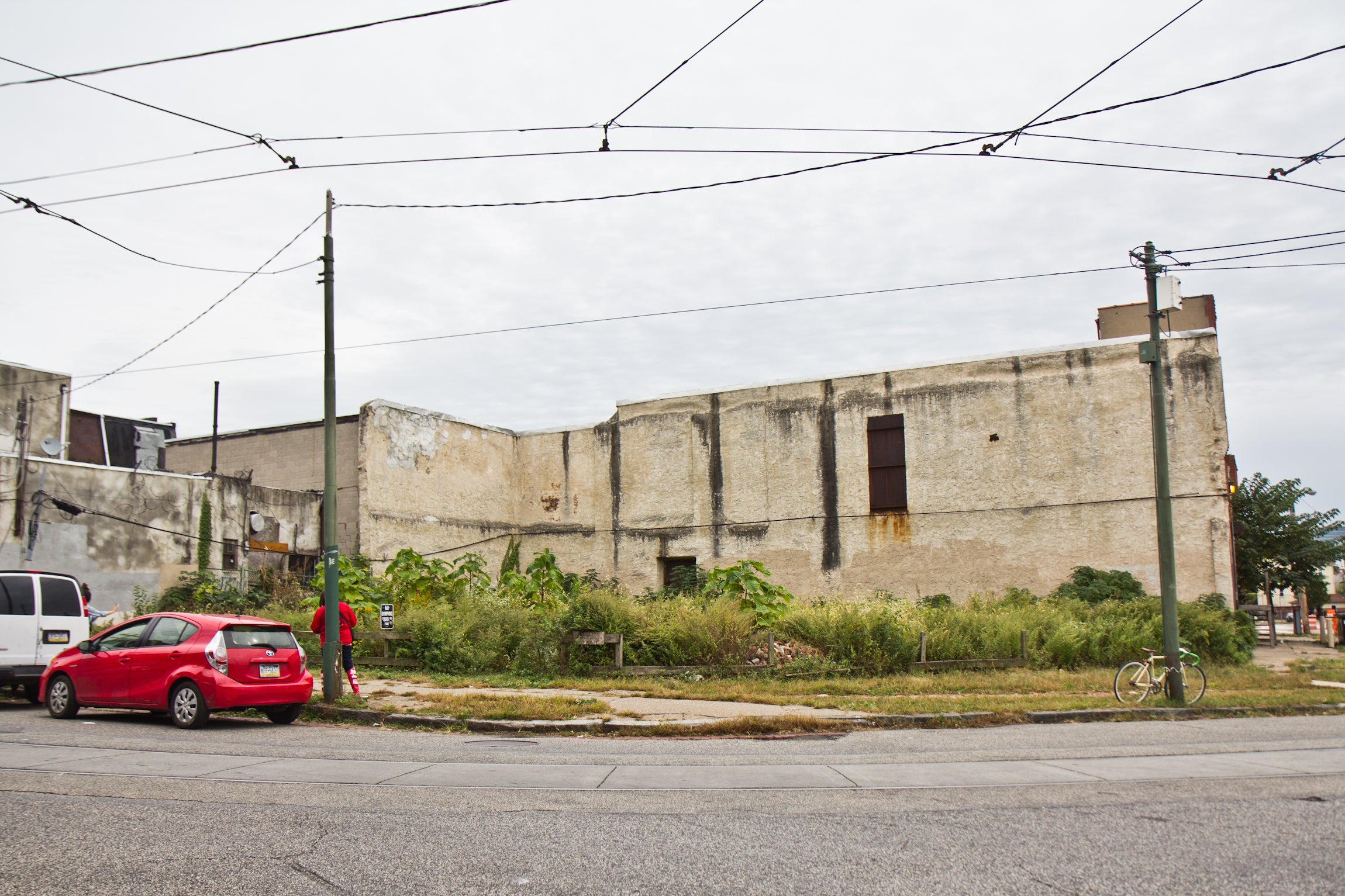
But before she could do either of those things, she needed to do a lot of research. When she first approached the city about a permit, they dismissed the Earthship design as “too strange,” likening it to a Flintstones house. When she approached low-income communities of color that she wanted most to benefit from the development, they rejected the idea too, she said.
“We wanted Earthship to feel all inclusive… but what we found was that when we used words like ‘composting’ and ‘recycling,’ neighbors got upset because they didn’t understand what we meant,” Ali-Campbell said. “We found ourselves having to educate on the very basics of sustainability principles…people who are living in survival mode don’t really have time to learn [this information]. We had to bring them into the conversation.”
So she started attending City Council and school district meetings, community forums, and university lectures to talk about the Earthship model — and to fundraise for the land she would need to start construction.
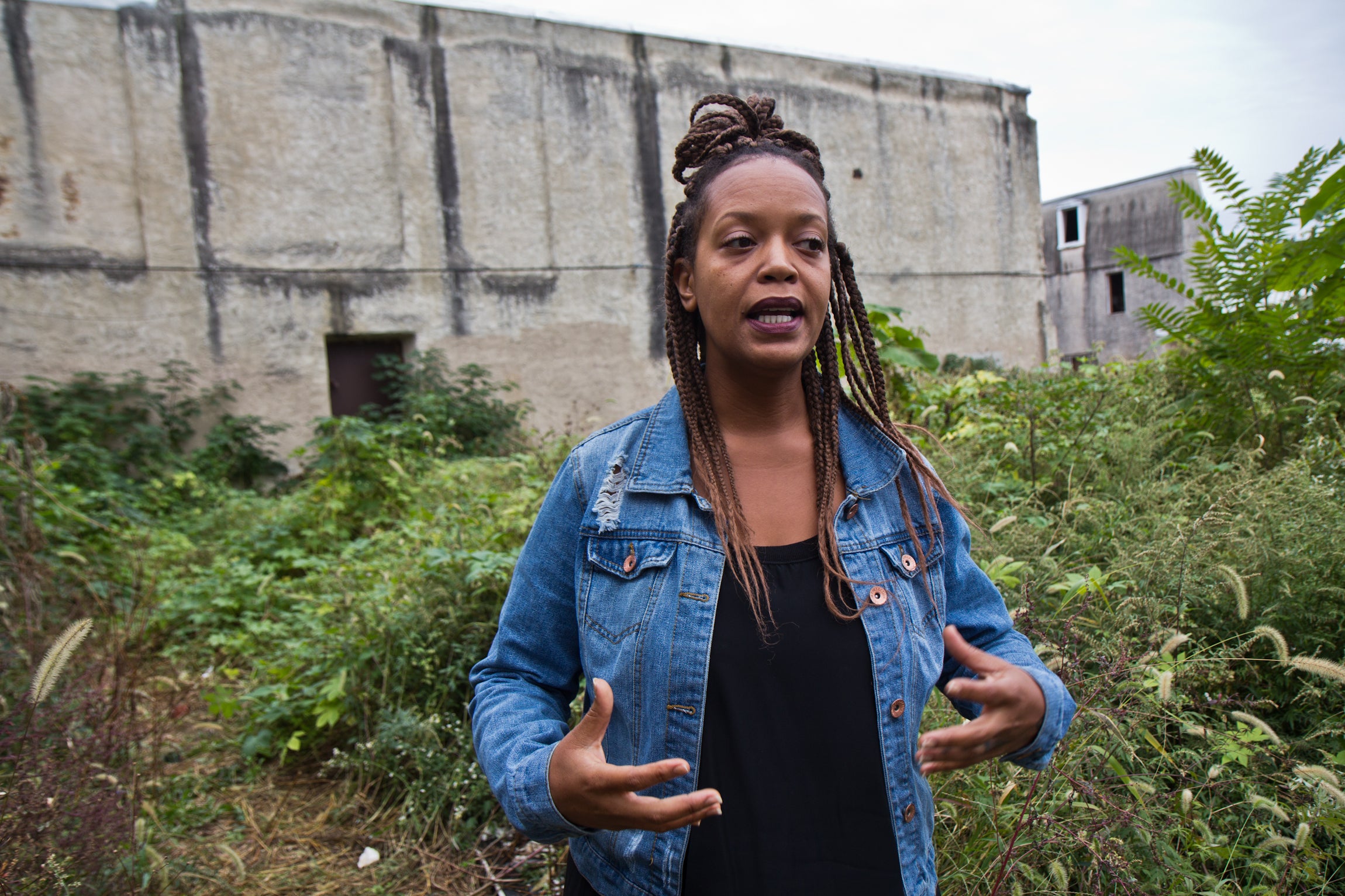
An ‘answered prayer,’ then a betrayal
In 2013, a West Philly resident named Thomas L. Miller called. He’d heard Ali-Campbell on the radio, talking about her plan to build an Earthship and lamenting the cost of property in Philadelphia. He was surprised she’d had such a hard time finding land — and was happy to donate two of his lots to the cause.
For Ali-Campbell’s Earthship 360 team as its called, that felt like an answered prayer.
“We started getting to work right away,” she said. “We started doing workshops. We started trying to get our contract together.”
And then one day, in Spring 2016, Ali-Campbell was browsing the web when she came across her own land listed for sale — for $50,000 and $100,000, or $150,000 total — by a company called Urban Property Solutions, LLC.
“I was horrified,” she said. “My heart dropped. I thought ‘Somebody must have stole my property, because I certainly didn’t sell it.’”
She called Urban Property Solutions, where a spokesman told her that he’d been sold the land for $1 by Miller. Then she called Miller and asked him whether he’d really sold it. He said no. Ali-Campbell didn’t know who to believe.
“I’m feeling upset, I’m feeling betrayed, I’m feeling like one of them is lying. Mr. Miller tells me he didn’t sell my property. That gentleman said he did sell that property. I was like, ‘What happened?’”
Finally, on a three-way call with the buyer that June, Miller confirmed that he had sold the property to Urban Property Solutions. And because Ali-Campbell hadn’t recorded the deed – she’d treated the 2013 donation as a transfer, not a purchase. She’d have to go into litigation over the transaction if she wanted to keep the land.
“It was heartbreaking,” Ali-Campbell added. “We kept getting volunteer calls and emails, and saying we’d [delayed the project]… and it hurt me because I didn’t have no answers for people who supported us.”
Anna Ly, 57, has run the corner store down the street for the past 20 years. In all those years, she’d never seen anything like the Earthship Ali-Campbell promised.
She wasn’t sure how to describe it. “A playground?” she hazarded. “A garden?” But she remembered the construction, and the excitement, and the posters in her shop window reading “We support Earthship Philadelphia.”
“They were here,” Ly said. “And then they were gone.”
The litigation process took three years.
In August, LoveLovingLove won the case. That’s all thanks to a Pennsylvania law that requires purchasers to inquire about possessors’ rights to a land before buying. A failure to do so affects the purchaser with “constructive notice,” meaning that they’re no longer a bona fide buyer and are excluded from the protection of a recorded deed.
In court, Javar Clark, an employee of Urban Property Solutions LLC, testified that he believed the lot was vacant when it was purchased, and showed pictures he had taken at the site to prove it.
Except that the pictures showed neatly stacked tires and wooden Earthship signs, which detailed Ali-Campbell’s contact information, website and rough plans for the land. The lot, the judge ruled, had been clearly occupied. The purchaser had not adequately inquired into possessor’s rights, and thus UPS’s deed was invalid.
Ali-Campbell said their win was “a gift from God.” Still, she added, “the fact that I didn’t know what I was doing in real estate. I paid for it heavily.”
The litigation cost her years of time, resources, and emotional drain.
“We worked on that property for three years before it was taken from us,” Ali-Campbell said. “It would’ve been devastating not to finish this work.”
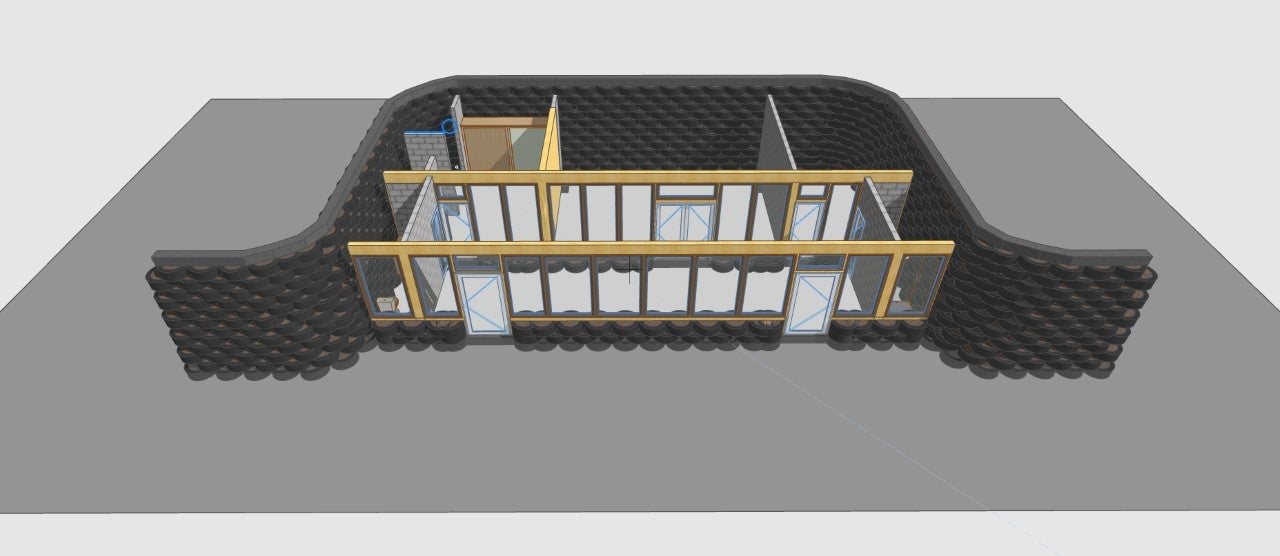
Earthship open by 2021
Ali-Campbell’s $200,000 cost estimate includes the Earthship’s architectural plans, building components, and construction.
She and Earthship Biotecture — an eco-construction company that assists in building these sustainable homes — plan to raise the money through an eight-week “Earthship Academy,” where students from around the country will travel to Philadelphia to receive hands-on instruction on eco-home building.
The tuition these 40 students pay will support the construction in the city, while the skills they learn will go with them back home — after finishing the program, they’ll be equipped to build their own Earthship, should they so choose.
Ali-Campbell plans to start the academy in the summer of 2020. The team will have the complete structure enclosed and finished by the following October.
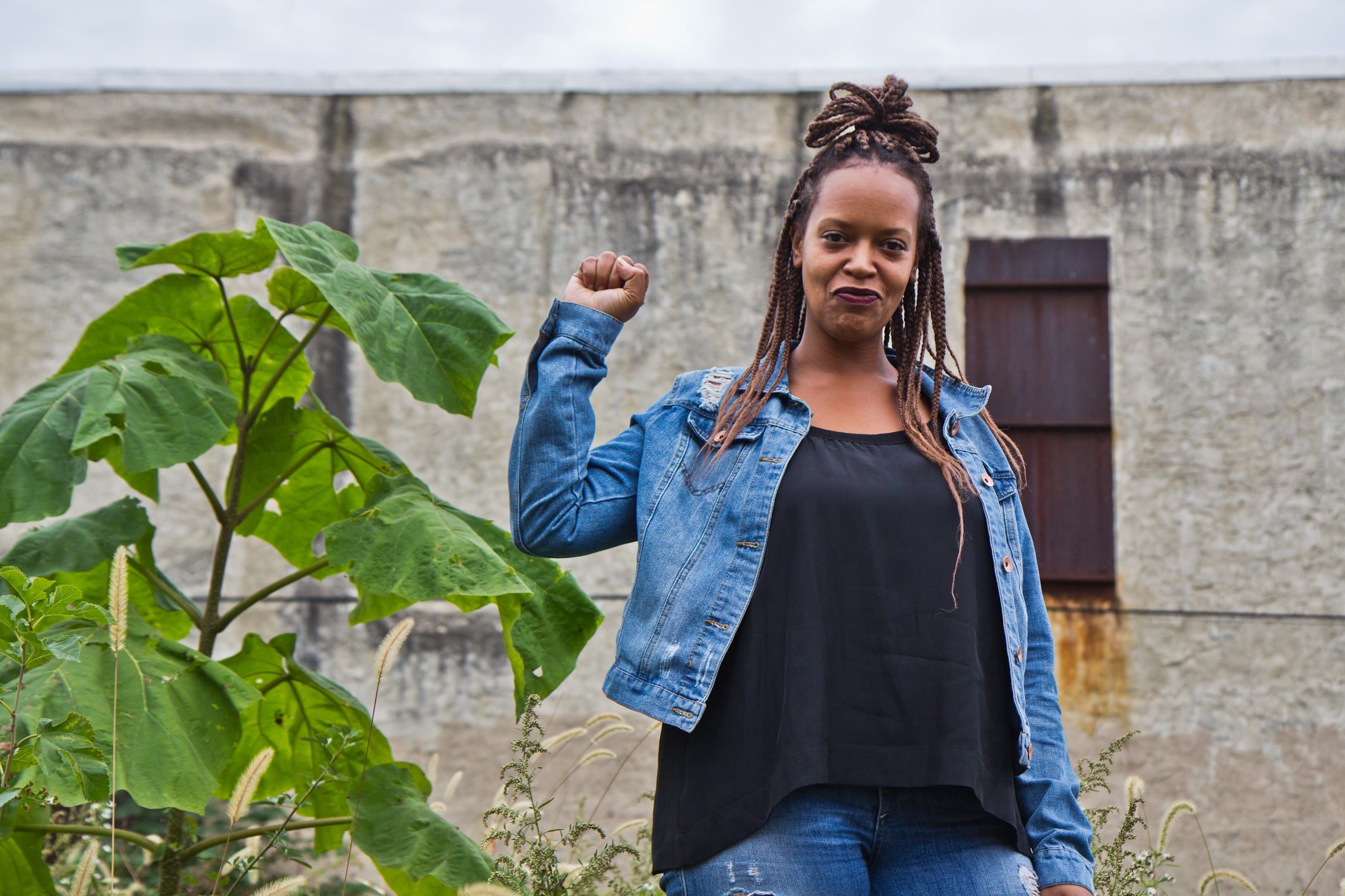
“It’ll be a finished, livable, historical building, with tours so [people] can see and touch and play with it and engage with it and fall in love with it the way we did,” she said.
She calls her Earthship “the Lord’s project,” since it’ll provide resources for the people who need it most. The space will double as a home base for LoveLovingLove to host neighborhood workshops, work with drug and alcohol recovery partners, and give out produce to local residents.
In the meantime, the weeds are coming down next week. The designs are back in circulation. And the broken bricks will soon be replaced by new ones, as part of the West Philly Earthship’s first fundraiser next month.
“We have a lot of work ahead of us,” Ali-Campbell said. “But we’ve been waiting [10] years to do it.”
This time, she added, “we’re not going to stop until it’s done.”
WHYY is your source for fact-based, in-depth journalism and information. As a nonprofit organization, we rely on financial support from readers like you. Please give today.




